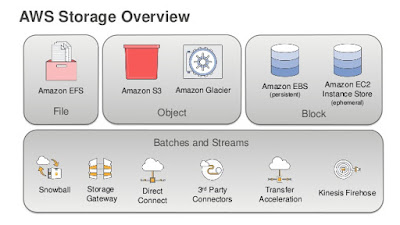Difference between Amazon S3 ,EBS and EFS.
Amazon S3 is an object storage and is suitable for storing user files and backups in massive numbers. Amazon EFS was designed to provide scalable storage for the users of Amazon EC2 cloud computing service
I am going to mention some benefits:
- It got internet accessible storage (http,https)
- You can drop videos, files, audio, backup (Like a bucket)
- It's very reliable, very scalable, very fast
- it works as a standard storage,
- Unlimited bucket size, 5TB max object size and reduce redundancy available
You can see more of S3 in my post S3
AMAZON EBS
Amazon EBS (Elastic Block Storage) is a storage for the drives of your virtual machines. It stores data as blocks of the same size and organizes them through the hierarchy similar to a traditional file system. EBS is not a standalone storage service like Amazon S3 so you can use it only in combination with Amazon EC2, a cloud computing service by AWS.
- This is equivalent to a Hard drive
- Store in a single availability zone
- No internet accessible
- Support incremental snapshot to S3 storage
- Use file system storage on your EC2 instance
AWS Elastic File System
if you want to run an application with high workloads that need scalable storage and relatively fast output
Amazon EFS is automatically scalable - that means that your running applications won't have any problems if the workload suddenly becomes higher - the storage will scale itself automatically. If the workload decreases - the storage will scale down, so you won't pay anything for the storage you don't use.
Glacier Storage
- User for infrequent access data (legacy files from old database, etc)
- It provides a very cheap storage (0.004 per GB)
- 256 - encryption
- Storage vault tied to a region
- Retrieve expectation 4-6 hpours
Ephemeral storage
The ephemeral disk is a temporary storage that it is added to your instance, and depending on your instance type the bigger is such storage. An instance store provides temporary block-level storage for your instance. This storage is located on disks that are physically attached to the host computer.
Instance store is ideal for temporary storage of information that changes frequently, such as buffers, caches, scratch data, and other temporary content, or for data that is replicated across a fleet of instances, such as a load-balanced pool of web servers.
- It's a free storage with the purchase of EC2
- It's a local storage on servers, running EC2 instance
- Access speed is not guaranteed
- Data is lost upon instance termination
So to verify the difference, please check the comparison between them
| AMAZON S3 | AMAZON EBS | AMAZON EFS |
|---|---|---|
| Can be publicly accessible Web interface Object Storage Scalable Slower than EBS and EFS | Accessible only via the given EC2 Machine File System interface Block Storage Hardly scalable Faster than S3 and EFS | Accessible via several EC2 machines and AWS services Web and file system interface Object storage Scalable Faster than S3, slower than EBS |
| Good for storing backups | Is meant to be EC2 drive | Good for shareable applications and workloads |
AWS Storage Option
 Reviewed by ohhhvictor
on
June 28, 2018
Rating:
Reviewed by ohhhvictor
on
June 28, 2018
Rating:
 Reviewed by ohhhvictor
on
June 28, 2018
Rating:
Reviewed by ohhhvictor
on
June 28, 2018
Rating:
















No comments: